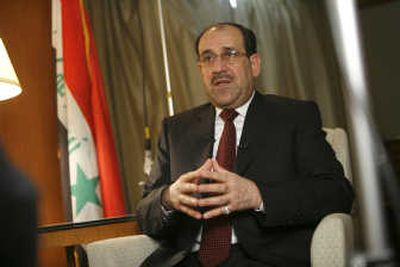Al-Maliki criticizes threats to sovereignty

NEW YORK – Iraqi Prime Minister Nouri al-Maliki walked a fine line Sunday: confronting his American backers over what he sees as violations of Iraq’s sovereignty while stressing that his relations are rock solid with the country on whose support he still relies.
“Success is shared,” he said in an interview, referring to his deeply intertwined partnership with President Bush and the U.S. government. “God forbid, failure is also shared.”
During a half-hour talk in his Manhattan hotel suite, the 57-year-old politician said it is unacceptable that U.S. security contractors would kill Iraqi civilians, a reference to a Sept. 16 shooting incident involving Blackwater USA that left at least 11 dead.
He also decried a recent arrest by U.S. forces of an Iranian citizen who had been invited into the country by Iraqi officials.
Al-Maliki, who has been leading his shaky, strife-worn Cabinet since May 2006, insisted Iraq is making progress. He said next year will bring still more improvement to ordinary Iraqis’ lives after four years of war.
In the country to attend the U.N. General Assembly, al-Maliki is on his first visit to the United States since the recent reports to Congress by Gen. David Petraeus and Ambassador Ryan Crocker gave his 16-month-old government a mixed review. In spite of that, he appeared to be in no mood to brook challenges to his leadership.
He repeatedly referred to Iraq’s sovereignty and how the government was answerable only to the people, in what could be read as a discreet way of telling others that Iraq’s security and prosperity will be Baghdad’s concern long after foreign forces have withdrawn.
Al-Maliki stressed that Iraq’s main duty is to protect its people and decide whom it will or will not let into the country. When U.S. contractors shoot at citizens or U.S. troops arrest guests of the government, that is “unacceptable,” he said.
The shooting deaths of civilians at Nisoor Square in Baghdad on Sept. 16 – allegedly at the hands of Blackwater USA security contractors – are among several “serious challenges to the sovereignty of Iraq” by the company, he said. In Arabic, he used the word “tajawiz” which also can be translated as “affront,” “violation” or an intentional challenge.
He also complained about the U.S. detention of an Iranian Thursday in northern Iraq who was accused by the military of smuggling weapons to Shiite militias.
Al-Maliki condemned the detention and said it was his understanding the man had been invited to Iraq by the Sulaimaniyah governorate.
Iraqi President Jalal Talabani, a Kurd, demanded the Iranian’s release on Saturday, saying he was a member of an official delegation that was in the autonomous Kurdish city of Sulaimaniyah with the full knowledge of the Iraqi government and local authorities.